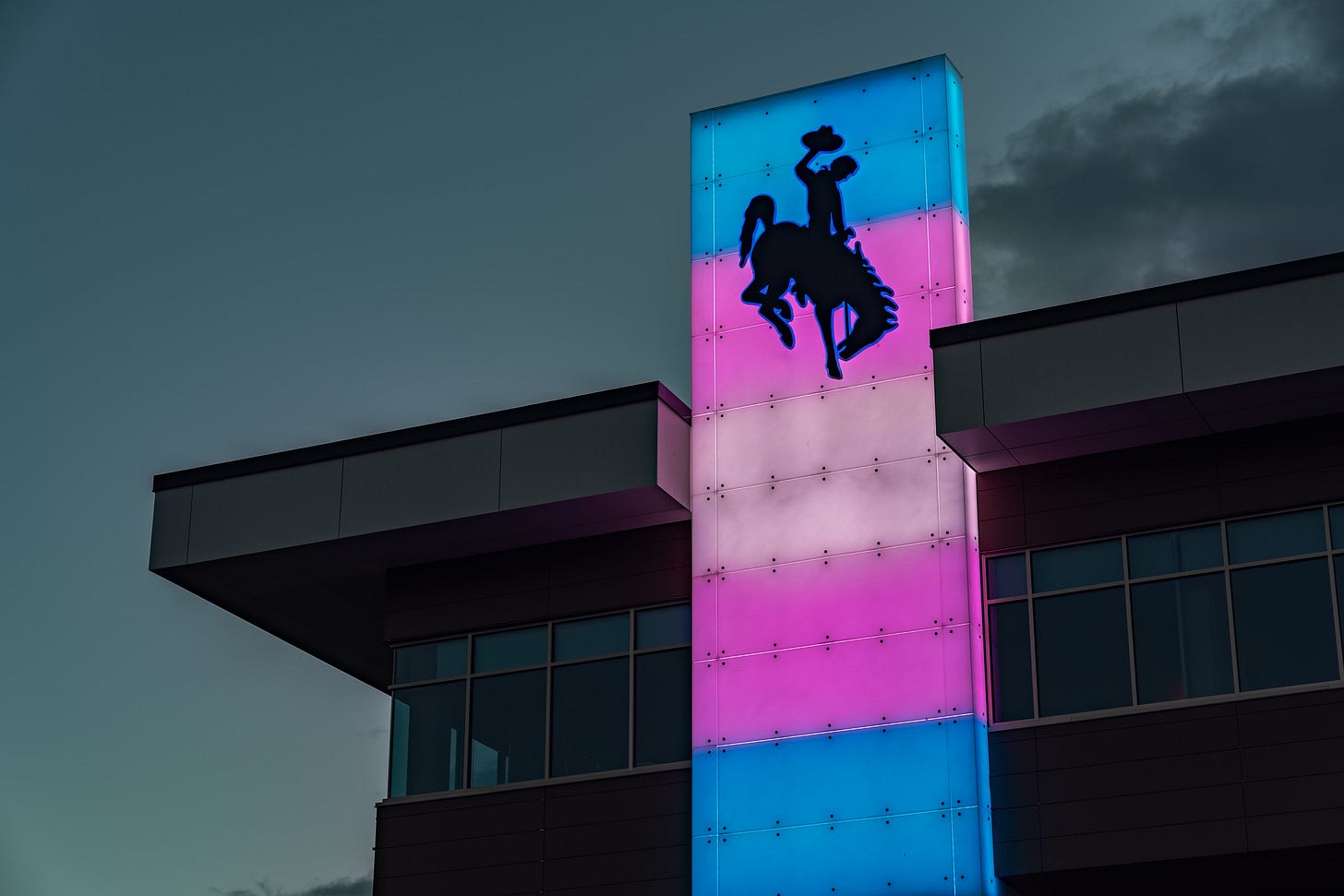Senate committee advances bill outlawing gender-affirming care
The committee heard a range of input from experts, parents and one detransitioner, but mostly from everyday Wyomingites with no close personal connection to the issue. They voted 5-0 to endorse SF99.
The Senate Labor Committee unanimously advanced a bill outlawing most gender-affirming care for trans youth during its meeting Wednesday.
The bill would prohibit doctors or other medical professionals from performing gender-affirming surgeries for anyone under the age of 18 — a practice that is rare and not widely recommended — but it would also prohibit professionals from offering hormone therapy to teens, which is often considered best practice care for trans youth.
Testimony on the bill ranged from the parent of a trans child begging lawmakers not to stand between his family and the life-saving medicine his child requires to a deluge of Wyoming residents with no close connection to the issue who leaned into various harmful, false stereotypes about the LGBTQ+ community. References to “brainwashing,” “abuse,” “mutilation,” and “grooming” were all made by those speaking in favor of the bill.
The committee also heard from medical professionals — who agreed that surgeries were “inappropriate” for those under 18, but argued the bill went far beyond this in banning a wider range of care — and from a “detransitioner,” an individual who went through surgical transition only to later regret it.
The bill passed without amendments and with the full support of the five-member senate committee, which included the bill’s sponsor, Sen. Anthony Bouchard (SD-6).
The committee went on to pass a companion bill, also sponsored by Bouchard, which would extend the statute of limitations for bringing civil claims against doctors accused of inappropriately fast-tracking surgical transition.
Gender-affirming care can be live-saving medicine
Gender-affirming care is not one thing. It’s a broad category of treatments, therapies and attitudes that evolve as a young individual grows into an adult.
In its earliest stages, as very young, prepubescent children begin asking questions about their gender identity, gender-affirming care simply means affirmation: letting a child wear what they want and go by their preferred pronouns and name.
As a child gets older — and in consultation with medical and mental health professionals and their parents — the child might start taking hormone blockers, allowing them more time to explore and figure out their relationship to gender. Beyond that, as a teenager, they might begin hormone therapy, taking testosterone or estrogen as they age into an adult body.
“The interventions fall along a continuum as well, from counseling to changes in social expression to medications (such as hormone therapy),” notes the Association of American Medical Colleges. “For children in particular, the timing of the interventions is based on several factors, including cognitive and physical development as well as parental consent.”
Beyond this, and almost always as a legal adult, a trans individual might decide to undergo surgeries to complete their transition.
There are a lot of “mights” in this explanation of gender-affirming care because the specifics vary from individual to individual. There are transgender people who decide to live as a gender inconsistent with their sex assigned at birth who nonetheless forego surgery. There are others who, in engaging with mental healthcare professionals, discover that transition is not actually what they are seeking or what would make them happiest.

But why would someone go to the trouble of transitioning, socially or medically?
Many, though not all, transgender people experience gender dysphoria — a “psychological distress that results from an incongruence between one’s sex assigned at birth and one’s gender identity” — which is a diagnosable medical condition recognized by the American Psychiatric Association.
Gender-affirming care — and specifically the provision of hormone therapy to those who seek it — is strongly endorsed by every major medical and psychological association in the United States.
It is not hyperbole to call gender-affirming care life-saving medicine. Youth who would like to receive hormone therapy and do are less depressed, less likely to think about suicide and less likely to attempt it than those who would like to receive hormones and don’t. Data on the mental health of queer Wyoming youth is limited, but a 2022 study found that 42 percent of such youth had contemplated suicide in the past year, and 17 percent had made an attempt.
Acceptance of trans and nonbinary youth appears to decrease these risks. Youth who have access to trans-affirming spaces or the ability to change gender markers on legal documents report lower rates of attempted suicide. Respecting a child’s pronouns is even more powerful.
“Transgender and nonbinary youth who reported having pronouns respected by all of the people they lived with attempted suicide at half the rate of those who did not have their pronouns respected by anyone with whom they lived,” notes the Trevor Project, which surveyed 35,000 LGBTQ youth across the country.
Bouchard seeks to outlaw this care anyway
Senate File 99 prohibits trans youth from receiving the medical aspects of gender-affirming care. (It makes exceptions for cisgender children seeking the same surgeries or hormones for several conditions other than gender dysphoria.)
Specifically, the bill would strip the medical license of any doctor or other medical professional who performs surgeries associated with gender transition or who prescribes hormone blockers, testosterone or estrogen to youth seeking transition care.
Bouchard attempted the same bill last year. It passed out of the Senate, but died when the House missed the deadline to consider it.
This year’s bill earned a unanimous vote from the Senate Labor Committee and several additional lawmakers appeared at the committee meeting Monday to testify in its favor.
“We need to stop medicalizing the bodies of our children,” Rep. Sarah Penn (HD-33) said. “Let’s work to stop the atrocities that are happening in our state and protect our children.”
Reps. Tamara Trujillo (HD-44) and Pepper Ottman (HD-34) also testified in its favor.
A parent pleads with lawmakers
As debates surrounding trans rights have played out in committee meetings — last session, during the interim and now in the current session — a familiar cast of characters has offered testimony during public comment periods.
Those predictable testifiers include both very concerned Wyomingites with no close personal connection to the issue and those with a more personal or professional connection, including detransitioners, representatives of the medical community and human rights activists.
When ACLU of Wyoming Advocacy Director Antonio Serrano took to the microphone this morning, he began with an accurate, polished account of the research surrounding gender-affirming care bans and the constitutionality of such bans.
But then he spoke of his personal connection to the issue, his voice catching as he reintroduced himself not as a representative of the ACLU but as “the parent of a child who struggles with mental health.”
“I know what it feels like to send my child to the hospital in Casper, to watch them leave in an ambulance after they made an attempt,” Serrano told lawmakers. “I know what it feels like to send my child to Denver, not knowing what’s going to happen or when they’re coming home. I know what it feels like to have a trans child who struggles with mental health, and have that child tell me, ‘Dad, I don’t want to be here anymore’ — to be the parent of a kid who doesn’t want to be here.”
He continued:
“No matter how much we’re there for them, or how much you show them you love them, you cannot break that wall of depression that consumes them. This bill will not stop Wyomingites from being trans — but it will deny critical support to help struggling transgender youth grow up to become thriving adults in our state.”
A detransitioner urges government action
The only other significant testimony to stem from a close personal experience of gender transition came from Chloe Cole — the out-of-state detransitioner for whom Bouchard’s bill, “Chloe’s Law” is named.
Cole underwent a double mastectomy at the age of 15 and soon after came to regret the decision. Now 19, she has become an advocate for bills banning gender-affirming care. She said she was inappropriately rushed into transition care and that her parents were led to believe they had no other choice.
“I’m a victim of this gender ideology that has been spread across the country through the internet,” she told lawmakers Monday. “This ideology targets kids like me, it targets kids who are different, who are autistic, who are struggling with puberty and their identity as they’re growing into adults. We have to stop the medical industry from taking advantage of these kids in the same way that I was taken advantage of … None of these adults who were supposed to help me — or my parents in raising me — told me that it was an option just to be myself.”
The experts weigh in
Cole’s experience with gender transition, while traumatic, is exceedingly rare. Surgeries are almost never conducted so soon in an individual’s healthcare journey nor so early in their adolescent development.
Such early surgery also flies in the face of the best practices for transgender care. That’s according to Dr. Michael Sanderson, a Sheridan pediatrician and the president of the Wyoming chapter of the American Academy of Pediatrics, who also spoke during the hearing Monday.
“My understanding of Ms. Cole’s situation is that she was inappropriately fast-tracked into medical and surgical treatment for gender dysphoria,” Sanderson said. “The American Academy of Pediatrics has already come out in open opposition to surgical treatment for minors seeking gender-affirming care — that is already a part of the standard of care.”
He added Wyoming pediatricians stand behind that standard.
“We do not recommend that children receive these surgeries,” he said. “This does not happen and it has never happened and it will probably never happen in the state of Wyoming.”
But Sanderson said a blanket ban — not just on surgery but on hormone blockers and therapy as well — sends a message to doctors that their expertise is not welcome in the state of Wyoming and that, should doctors choose to live here, they might have to decide between adhering to the highest standard of care and following the law.
“It is a frankly inappropriate intrusion into the practice of medicine,” he said. “I’m deeply concerned with the tone and the interest that the Wyoming Legislature seems to have in stepping between Wyoming citizens and their doctors. And it seems to be an increasing trend over time. This is highly inappropriate and it is dangerous.”
Given the medical profession’s opposition to gender-affirming surgery for youth, Sanderson expressed frustration that the state chapter of the American Academy of Pediatrics was not consulted in the crafting of this bill. Neither was the Wyoming Medical Society, which its director, Sheila Bush, lamented during her own testimony.
“Sadly, despite our repeated offers to work with the sponsor on this bill last year, that didn’t come to fruition and so we were again not included in the language, which I think is unfortunate,” Bush said. “We were able to work with a sponsor on the House side on a bill that was far cleaner and would have accomplished what I think the primary concerns are.”
This was also a complaint raised Monday by Wyoming Equality’s Sara Burlingame, who said her organization would be comfortable with a ban on surgery for youth, but not the ban on best-practice hormone blockers and therapy.





